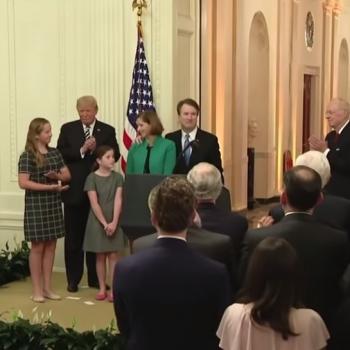One of the key things I have attempted to do over the past year has been to build bridges with people who are often on the “outs” of Evangelical Christianity (ironically, this placed me on the “outs” as well). I realized over the course of time that there are many people who don’t give this following Jesus thing a full shot, not because of anything Jesus said or did but because of things we say and do. In far too many circumstances, we’ve become the barrier instead of the bridge that leads to free flowing “living water”.
This is something I long to change. I believe the life Jesus has to offer—and ONLY Jesus offers—is something that can continue to revolutionize the world, just as it did when the movement was still a cluster of 12 misfits and a radical rabbi.
However, since God’s primary way of working in the world seems to be through the human agency of his followers, we must contend with the fact that our actions can take the movement forward—or even slow it down. In light of this truth, I think it is a wise move to always be analyzing our individual and collective behavior so that we can be in a perpetual process of “refining” ourselves in order to be more effective landmarks that point others to Jesus.
The Apostle Paul recognized this truth when he said “I have become all things to all people that I might win some”. He recognized the need to be always adapting, always improving, and always changing in order to effectively communicate the message of Jesus within various scenarios. We must continue this practice if we honestly desire to effectively invite more and more people to this big party that God is throwing.
In our current culture, I think there is certainly no shortage of ways that we can become “better Christians”, but in considering the many interactions I’ve had with thousands of folks over the past year, here are five that I think are absolutely key to the vitality of Christianity:
1. We might want to dial down the arrogance.
Let’s be honest: arrogance is a turn-off for most people. It’s not attractive, it’s not effective, and it only hinders the movement. I think many people push back against this idea, instead claiming that we must cling to “absolute truth”. What we often fail to realize however, is that we can cling to what is true without doing so in an arrogant or obnoxious way.
I’m not sure why arrogance is so prevalent in our movement, but it’s a turn off even to me—and I’m a devoted Jesus follower. If we want to invite more people in, we need to dial this down a notch or two and “clothe ourselves in humility” as scripture commands us to do.
2. We’d do well to start assuming the best in each other.
As I watch so much of Christian infighting, I have come to the conclusion that much of it (not all) is rooted in a failure to assume the best in each other. To be honest, sometimes I’m on the receiving end of that, but I’ve also been on the giving end of it as well—something that I really hope to do better at, even when I profoundly disagree with others.
When we consciously or unconsciously judge the heart and motive of another person, we sin against the God who is the only one able to judge such matters. The far better option when we encounter someone we disagree with or who sees things differently than we do, is to simply assume the best in them. This doesn’t mean we agree with each other all the time, but it does mean our hearts are more humble and tender when we do.
3. We could refrain from attempting to apply scripture to the lives of others we don’t actually know or have relationships with.
I’m all about discussing the truth (as I understand it) and pointing people to the truth (as I understand it) but the application of biblical truth to the life of another is a whole new ballgame. Applying scripture to an individual life is not cut and dried—we all have different stories, different struggles, different levels of understanding… we’re different in a lot of ways. A great example was the rich man who went away from Jesus sad, because Jesus told him that he needed to sell everything and give it to the poor. Jesus doesn’t call all of us to do that—but for this man, that extreme example was what applying biblical truth looked like. Application looks different for everyone.
Because God’s path is personalized to the individual in so many ways, it’s not simply possible to walk up to people we don’t know and are not in relationship with, and think that we have a handle on how to best apply scripture to their lives.
We don’t—that understanding only begins to come when relationship and knowledge are both in harmony.
4. We could actively look for ways to reconcile “all things” to God.
One of the messages in the New Testament is that Jesus went to the cross in order to reconcile “all things” to God. As a natural outgrowth of that fact, Paul teaches that you and I have been since given the “ministry of reconciliation” as God’s agents here in the world.
This means that the first order of business in the life of a Jesus follower is to answer the question: “What can I help reconcile?”
If you’re a Jesus follower, you’ve been given the task of mending things that are broken—individual relationships, collective relationships, the environment, etc. If it’s broken, our task is to figure out how we can contribute to fixing it. However, these things don’t always fall in our lap, and sometimes we don’t notice them when they do. As such, we must always be on the lookout for ways that we can reconcile the world back to the God who created all of it.
5. We could spend more time getting to know the “other”.
So many of the tasks we’ve been given as Jesus followers hang on this one point. True humility is born out of knowing ourselves and others as we/they truly are in God’s eyes. Assuming the best in others becomes a critical aspect of removing barriers so that we can actually begin the process of getting to know the other. Learning to help apply scripture at the right time and in the right way means we must first know the “other”. And finally, reconciling all things and all people to God requires that we actively work to know and establish positive relations with all things and all people.
Jesus understood this—which is why he spent so much of his time getting to know people and establishing relationships with them. His followers must trust his example, and come to realize that building relationships and getting to know the “other” is often the very first step that must take place before God is able to use us in full capacity.
///
I believe in this Jesus thing. I think it’s the best thing the world has ever known, and I’ve sworn my life to it. As such, I want to be in a continual process of always finding ways to be a “better Christian” so that I can be used by God in any way he desires.
These are 5 ways I think we, collectively, could work together to learn to be “better Christians” and agents of God’s reconciliatory work in the world.

















